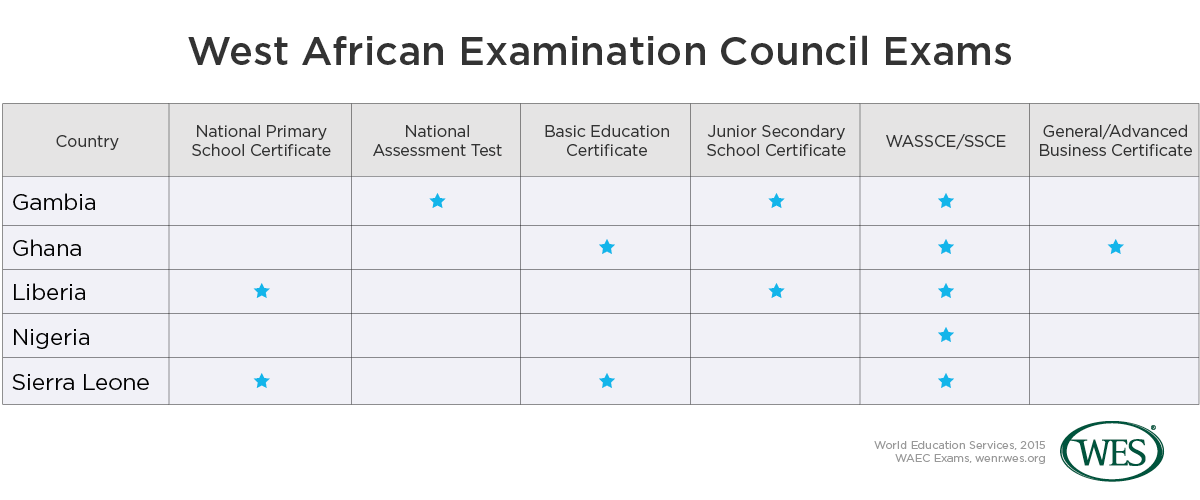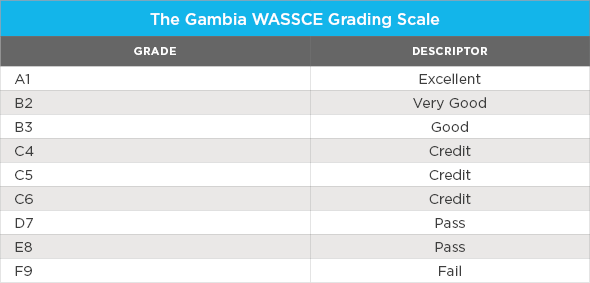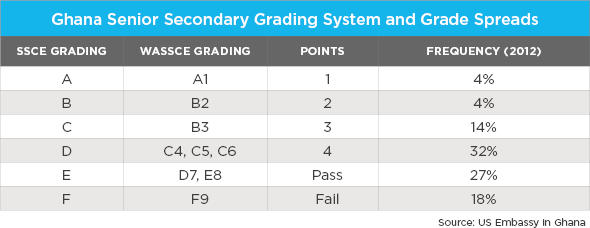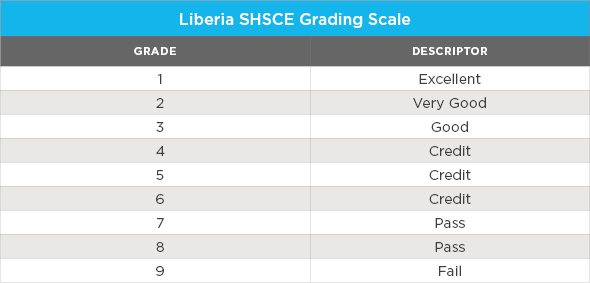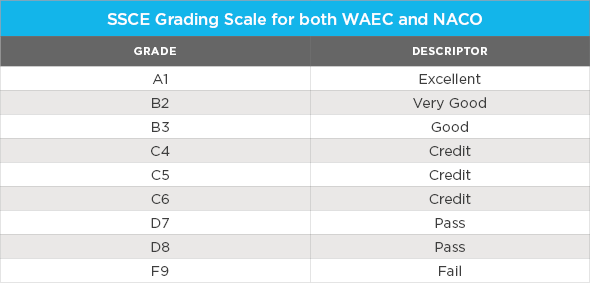School Examinations and Curricula in Anglophone West Africa: Gambia, Ghana, Liberia, Nigeria, Sierra Leone
Nick Clark, Editor, World Education News & Reviews
The West African Examination Council (WAEC) conducts examinations in the five Anglophone countries of West Africa. In this article we offer a country-by-country overview of the school systems and corresponding WAEC credentials in Gambia, Ghana, Liberia, Nigeria and Sierra Leone. For an overview of the WAEC region, please see this month’s feature article.
The Gambia
In The Gambia the West African Examinations Council administers The Gambia Basic Education Certificate Examination (GABECE), taken at the end of upper basic school (nine years), in addition to the West African Senior School Certificate Examination (WASSCE), taken at the end of the Senior Secondary School curriculum (12 years). The GABECE was first introduced in 2002, replacing the Junior School Leaving Certificate. The Senior Secondary School curriculum and the West African Senior School Certificate were adopted in 1998.
According to WAEC data, just over 14,200 students took WASSCE examinations in 2012, an increase of 14 percent versus 2011. Including the basic education examinations, a total of just over 115,000 Gambian students took WAEC administered examinations in 2012.
Basic Education WAEC Curriculum
In 2002, a new unified basic and compulsory education system was introduced to cover the first nine years of schooling. The nine years of basic education are divided into two cycles: lower basic and upper basic. Students transition automatically and without examination to lower secondary school at the end of the six years of the lower basic cycle. At the end of the lower secondary cycle, all students sit for the Basic Education Certificate Examination.
Students sitting for the GABECE take examinations in four core subjects, at least one elective ‘general’ subject from a pool of seven subjects, and at least one ‘pre-vocational subject’ from a pool of five. Students can take a maximum of three general and three pre-vocational subjects for a maximum load of 10 subjects. The four core subjects are:
- English
- Mathematics
- Science
- Social and environmental studies
Since 2008, the WAEC has also conducted the National Assessment Test for the Gambian government, which offers assessment data used to monitor learning and teaching standards in the core basic subject areas of the national curriculum, but does not determine student progression within the system. This census is taken annually by all students in grades 3, 5 and 8.
The country’s lower basic school completion rates have increased from 39 percent in 1992 to 66 percent in 2011.
Senior Secondary Education and the WASSCE
Admission to senior secondary/high school is competitive, based on results from the GABECE. Approximately 75 percent of Gambian senior secondary students attend public schools, with the remainder attending private and international private secondary schools offering Cambridge IGCSE / O & A levels, the WASSCE or both.
The WASSCE is administered each year in May/June for school candidates and November/December for private candidates. The May/June examination is administered to candidates in the third (final) year of Senior Secondary School. The November/December examination is administered to candidates who have completed either basic or senior secondary school, but are not registering directly through the school system.
Examinations are offered in 32 subject areas, including five core subjects:
- English
- Mathematics
- One science subject (general science, chemistry, physics, biology)
- One social science subject (literature, geography or history)
- One agricultural, vocational or technical subject.
Students take three or four elective subjects in addition to their core subjects. Private candidates may enter for as few as one subject in the November/December examination.
Grading
Grades A1 through E8 are passing grades, but only A through C (credit grades) are considered for university admissions. Students can retake examinations in subjects they have failed.
Assessing and Verifying Student Performance on the WASSCE
The WAEC statement of results, or transcript, shows grades for all subjects taken including failed subjects. The secondary school transcript should contain a letter or percentage grade for each subject, for each of three terms, for the three years of senior secondary school. Term reports (transcript) contain rank in class for each subject as well as grades for classwork and end of term examinations. As with all WAEC examinations, in-class assessment counts for 30 percent of a student’s final grade.
Students can purchase results checker cards for the WASSCE to view their results online. This is also recommended as a means of verifying and evaluating results and credentials as a third-party evaluator. Students should provide the credential evaluator with a PIN number that they can purchase for the equivalent of roughly $3 (available at post offices, banks or WAEC regional offices), that can then be used to retrieve a printable copy of their WAEC results. Results dating back to 1993 for both the GABECE and the WASSCE (and predecessor WAEC examinations) can be verified this way.
The minimum standard for admission to regional universities is five credit passes (A-C) on the WASSCE, including mathematics, English and a social science subject. Undergraduate admissions offices in the United States should not consider applicants unless they have these minimum passing standards.
International credential evaluators should request a copy of the WASSCE Statement of Results, sent directly from the WAEC offices. These documents can be verified through the WAEC results checker site noted above.
Ghana
In Ghana, the WAEC delivers the Basic Education Certificate Examination (BECE), taken at the end of junior high school (year nine), and the West African Senior School Certificate Examination (WASSCE) at the end of upper secondary school (year 12). In addition, it offers the General and Advanced Business Certificate Examinations (G/ABCE) at the upper secondary and post-secondary levels.
WAEC also conducts examinations on behalf of 15 foreign professional bodies and examination boards, far more than in any other WAEC member country. In 2012, close to 31,000 Ghanaian students sat for examinations conducted by WAEC on behalf of other organizations.
A total of 423,000 students took the BECE in 2014, up from 377,000 students in 2012, while 242,157 students took the 2014 May/June WASSCE and close to 150,000 took the November/December exams in 2013. In 2011, close to 288,000 students took the WASSCE, so there have been significant increases in test-taker numbers in recent years.
Basic Education Curriculum and WAEC Examinations
The BECE was first awarded in 1990. Students sit for the examination in eight subjects, with the option to also take French:
- English
- Ghanaian language and culture
- Mathematics
- Science
- Social studies
- Design and technology
- Information and communication technology
- Religious and moral education
Students are tested both internally and externally. Admission to senior high school is competitive and based in part on performance on the BECE.
Senior Secondary Education and the WASSCE
The WASSCE was introduced in 2006, replacing the Senior School Certificate Examination which was in place until 2007 and in turn replaced the General Certificate of Education in 1993.
Students entering senior secondary school between 2007 and 2009 took four-year WASSCE programs. The system has since reverted back to the common three-year senior secondary program. As a result of these changes, there was no graduating cohort in 2010 and two cohorts in 2013.
The WASSCE is administered each year in May/June for school candidates and October/November for private candidates. The May/June examination is administered to all candidates in the third (final) year of senior secondary school. The October/November examination is administered to candidates who have completed either basic or senior secondary school but are not currently enrolled in high school or are retaking subjects failed previously.
Most Ghanaian high school students attend public schools, many of which are highly competitive. A small number also attend international private secondary schools, offering the International Baccalaureate or GCE A-level curricula.
School candidates following the senior secondary curriculum are examined in four core subjects:
- English
- Mathematics
- Integrated science
- Social studies
In addition, candidates are examined in three or four elective subjects (for a total of seven or eight subjects) from one of six streams:
- Agricultural
- Business
- Technical
- Vocational
- General
- Sciences
Students must also take physical education and moral education, although they are not examined in these subjects. Not all schools offer all five streams, but they are required to offer at least two. Private WASSCE candidates may enter for as few as one subject.
General & Advanced Business Certificate Examination
The General Business Certificate Examination is offered at the senior school level and can be taken as a multi-subject certificate or in individual subjects. Certificates are awarded for single-subject passes or the multi-subject pass. For the award of a group certificate, a candidate must pass a minimum of two core subjects and three electives. A candidate who is unable to satisfy the criterion for the award of a group certificate is awarded a certificate for each of the subjects passed.
The Advanced Business Certificate is a post-secondary award that is offered in single subjects or across a group of subjects (diploma). For the award of the diploma, candidates must take and pass examinations in three compulsory subjects and two electives.
Grading
The secondary school transcript should contain a letter or percentage grade for each subject, for each of three terms, for the three years (four between 2007 and 2009) of senior secondary school. Term report cards contain rank in class for each subject as well as grades for classwork and end of term exams (continuous internal assessment).
The grading system is stringent compared to the United States. ‘A’ grades are very rarely awarded, and while over 80 percent of grades were passes of grade E8 or better in 2012, only 53 percent were passes at the credit level (A1-C6) required for university admissions. Given that only one in five of grades earned were a B or better, high C’s are considered competitive grades.
Assessing and Verifying Student Performance on the WASSCE
The minimum university standard for admission to post-secondary education is a C6 average on the WASSCE (D on the SSCE), with credits (A1-C6 or A-D) in three core subjects and three electives, with a total aggregate score not exceeding 24 points. U.S. universities looking at Ghanaian undergraduate applications should consider this a minimum requirement for admission. The best possible aggregate score for university admissions (6 x A1) is 6 points.
International credential evaluators should request a copy of the WASSCE Statement of Results, sent directly from the WAEC offices. These documents can be verified quickly and reliably through the West African Examinations Council’s online system. Students should provide the credential evaluator with a PIN number that they can purchase for the equivalent of $3 (available at post offices, banks or WAEC regional offices), that can then be used to retrieve a printable copy of their WAEC results. All results from WAEC exams dating back to 1990 can be verified through the WAEC Direct system.
Liberia
In Liberia, the WAEC delivered the Liberia Primary School Certificate Examination (LPSCE), taken at the end of primary school (year six) until 2011 when it was phased out. Current examinations offered by WAEC are the Liberia Junior High School Certificate Examination (LJHSCE), taken at the end of junior high school (year nine), and the West African Senior Secondary School Certificate (WASSCE) which was introduced in 2013 on a trial basis, and is replacing the Liberia Senior High School Certificate Examination (LSHSCE), taken at the end of senior high school (year 12).
The LPSCE was first awarded in 2005, the LJHSCE in 2003, the LSHSCE in 1998, and, as noted above, the WASSCE in 2013. Due to the Liberian civil war it can be extremely difficult for some students to obtain academic records as many educational institutions and their records were destroyed during the conflict.
According to WAEC data, approximately 30,000 students took the LJHSCE in 2012 and close to 34,000 took the LSHSCE.
Basic Education Curriculum and WAEC Examinations
The LPSCE was taken by students at the end of sixth grade in four core subjects:
- Mathematics
- General Science
- Language Arts
- Social Studies
Students were assessed both internally and externally. Continuous in-school assessment counts for 40 percent of the final grade and external examinations 60 percent. The minimum passing mark is 60 percent in each subject. Students had to pass in three of the four subjects to be awarded the LPSCE.
In 2011, a compulsory nine-year basic education plan was put in place, phasing out the LPSCE. However, current enrollment is very low, due to war-ravaged infrastructure, limited public schools and a lack of qualified teachers. According to UNESCO data, net enrollment (ratio of enrolled primary-aged students as a ratio of total primary-age population) at the primary level was just 34 percent in 2013 with grade six completion rates standing at just 34 percent. Students that do finish primary education, continue on to junior high school to take the Liberia Junior High Schools Certificate Examination (LJHSCE).
The LJHCE is administered to candidates at the end of junior high in the ninth grade. Students are examined in the same subjects as the LPSCE (see above). They are assessed both internally and externally. Continuous in-school assessment counts for 40 percent of the final grade and external examinations 60 percent. The minimum passing mark is 60 percent in each subject. Students must pass in three of the four subjects to be awarded the LJHSCE.
Senior High School: The WASSCE in Transition
The Liberia Senior High School Certificate Examination is administered to candidates at the end of senior high school (12th grade). Students take eight or nine subjects, which are offered in three groupings:
- Core compulsory
- English
- Mathematics
- General
- Economics
- Geography
- History
- Literature
- Science
- Biology
- Chemistry
- Physics
Grading
Students are assessed both internally and externally. Continuous in-school assessment counts for 30 percent of the final grade and external examinations 70 percent. Students must pass in a minimum of six subjects including all core subjects and at least one from the other two groups to be awarded the LSHSCE.
Student performance is then further subdivided as follows:
Division I
- Pass at least six subjects from the three subject groups;
- Obtain an aggregate of at most 24 in the best six subjects; and
- Pass mathematics and English language with credit.
Division II
- Pass at least six subjects from the three subject groups;
- Obtain an aggregate between 25 and 36 inclusively in the best six subjects; and
- Pass mathematics and English language with credit.
Division III
- Pass at least six subjects from the three subject groups;
- Obtain an aggregate between 37 and 48 in the best six subjects; and
- Pass mathematics and English language with a grade of 7/ 8.
West African Senior School Certificate Examination
The West African Senior School Certificate Examination was piloted at a handful of schools in 2013 in preparation for a wider roll out in 2014. However, in 2014 just over 5,000 students took the WASSCE versus 27,600 who took the SHSCE, suggesting that the WASSCE is yet to be widely adopted in Liberia.
University Admission
The University of Liberia conducts its own university admissions examination. In 2013, approximately 25,000 students took the entrance examination and no students passed. A total of 308 students reached the required threshold on the mathematics section but none of those students also reached the threshold on the English section.
The university later admitted, on a provisional basis, 1,600 students who scored highest on the entrance examination. These students were required to take remedial mathematics and English courses in order to meet the regular admission standards. In 2014, approximately 13,000 students took the entrance examination, and 15 passed the test. Again, a large group of students were admitted on a provisional basis.
At Tubman University, Liberia’s other public university, an entrance examination is also required but admissions standards appear to be more lenient than at the University of Liberia. Cuttington University, Sub-Saharan Africa’s oldest private university, does not require a separate admissions examination, setting standards on high school GPA and performance on the WAEC school leaving examinations.
Assessing and Verifying High School Student Performance
International credential evaluators should request a copy of the LSHSCE or WASSCE Statement of Results, sent directly from the WAEC offices. These documents can be verified quickly and reliably through the West African Examinations Council’s online system for Liberia.
Students should provide the credential evaluator with a PIN number that they can purchase for the equivalent of $3 (available at post offices, banks or WAEC regional offices), that can then be used to retrieve a printable copy of their WAEC results.
Nigeria
The West African Examinations Council conducts the West African Senior Secondary Certificate Examination (WASSCE) at the end of senior secondary school (year 12). An equivalent national examination has also been offered by Nigeria’s National Examinations Council (NECO) since 2000.
In 2012, 2,109,192 candidates sat the summer WAEC-administered SSCE, while 1,088,530 sat the NECO version.
Senior Secondary Education and the SSCE
The senior secondary cycle lasts three years. A new curriculum was introduced in 2011, with students taking the first Senior Secondary Certificate Examinations under the new curriculum in 2014. Students now take four core subjects and four to five electives. The four core subjects are:
- Mathematics
- English
- Civic education
- One trade/entrepreneurship subject (34 subject offerings)
For elective subjects, students choose three to four subjects from a pool of offerings in one of four specializations:
- Science and mathematics
- Technology
- Humanities
- Business studies
In addition, students choose one or two electives from other specializations or trades.
Previously, all senior secondary students were required to study English, mathematics, one science subject and one Nigerian language. All the other subjects were electives and selected based on interest.
At the end of the 12th grade in May/June students sit the West African Senior School Certificate Examination (WASSCE). They are examined in eight or nine subjects, depending on the number of courses pursued (students can drop one of their three electives). Successful candidates are awarded the Senior Secondary Certificate, which lists all subjects successfully taken.
The General Certificate of Education A-level examinations were replaced by the SSCE in 1989; however, students can still sit these exams in November, if interested or needed because of poor SSCE results.
Grading
The West African Examination Council and the National Examination Council (NECO) issue the Senior School Certificate, depending on the examination board used. The SSCE grading scale is as follows for both WAEC and NECO administered examinations:
Assessing and Verifying Student Performance on the WASSCE
The Senior Secondary Certificate Examination is one of the requirements for undergraduate admission into a Nigerian university. A student must score an average grade of ‘credit’ level (C6) or better in English and four other courses relevant to his or her major to be considered.
Admission to higher education is highly competitive and while minimum standards for university entry exist, those standards may not guarantee admission. The Joint Admissions and Matriculation Board (JAMB) is the statutory body responsible for coordinating all admissions to bachelor degree programs at all Nigerian universities.
Those students who achieve credit level (C6) or better in English and four other subjects relevant to their major are eligible to take the University Tertiary Matriculation Examination, the centralized university admissions test administered by JAMB. The cut-off mark on the test for most universities is between 180 and 200 out of 400. For high-demand universities or programs, the cut-off mark is higher. Many universities also conduct additional screening and post-UTME examinations before a final admission decision is made.
For the UTME, students must take exams in English and three subjects related to their proposed major. A total of 24 different UTME subjects are offered, with six considered science subjects, 14 arts and humanities, and four commercial. The five most popular UTME subjects are mathematics, chemistry, government, economics, and physics.
Each student can choose up to six institutions: two universities, two polytechnics and two colleges of education, with first and second choice programs for each institution, when registering with JAMB for the UTME. The most popular universities in 2011 among JAMB applicants were the University of Lagos (99,195 applicants for 6,106 places), followed by Ahmadu Bello University (89,760), the University of Nigeria Nsukka (88,177), Nnamdi Azikiwe University (84,719) and the University of Benin (80,976).
It is possible to access student results through the West African Examinations Council (WAEC)/or National Examination Council (NECO) websites. The student must provide the PIN number that they purchase for the equivalent of $3 (available at any post office, bank or WAEC regional office). With the PIN number it is possible to retrieve a printable copy of their WAEC results. This is the fastest and most reliable way of verifying a student’s results from Nigeria.
Sierra Leone
In Sierra Leone, the WAEC delivers the National Primary School Examination (NPSE), taken at the end of primary school (year six); the Basic Education Certificate Examination (BECE), taken at the end of lower secondary school (year nine); and the West African Senior School Certificate Examination (WASSCE) at the end of upper secondary school (year 12).
Due to the protracted civil war in Sierra Leone, implementation of the WASSCE was delayed until 2000. In 2013, an extra year was added to the upper secondary cycle due to poor nationwide performances on the WASSCE, which meant there were no school-administered examinations in that year.
In 2012, close to 74,000 students sat for the WASSCE examination, up from 45,000 in 2010, while 83,000 took the BECE and 97,000 took the NPSE.
Basic Education Curriculum and WAEC Examinations
On completion of six years of primary schooling, students take the National Primary School Examination. Students must obtain 50 percent or above to continue on to secondary education. In 2010, 75 percent of test takers passed.
At the end of junior secondary school, students take the Basic Education Certificate Examination (BECE) which determines whether they will continue their education at general or specialist senior secondary schools or proceed to technical and vocational schools. There are four core subjects that all students must take:
- Language Arts
- Integrated Science
- Social Studies
- Mathematics
Students must also take two optional core subjects and two electives. Four subject passes including language arts or mathematics are needed for the award of the Basic Education Certificate, which allows passage to senior secondary school. The pass rate for the BECE in 2011 was just 47 percent.
Senior Secondary School and the WASSCE
School students must take a minimum of seven WASSCE subjects including English language, however, they typically take eight subjects, four of them core compulsory, two from their core major and two electives. The examination syllabus consists of 38 subjects covering science, technical, vocational, languages, arts and general subjects.
Core subjects:
- English
- Mathematics
- Integrated science
- Social studies
Senior secondary results are improving in Sierra Leone, but are behind other WAEC countries. Almost 40 percent of students failed to obtain a single WASSCE credit (C6 or better) in 2011 and only 10 percent received credits in four or more subjects, with just one in 20 obtaining the five credits or better needed for university entry.
Grading
The secondary school transcript should contain a letter or percentage grade for each subject, for each of three terms, for the three years of senior secondary school. Term reports (report cards) contain rank in class for each subject as well as grades for classwork and end of term exams (continuous internal assessment).
 Sample Documents: Sierra Leone
Sample Documents: Sierra Leone
Assessing and Verifying Student Performance on the WASSCE
Grades A-E are passes, but only A-C (credit grades) are considered for university admissions. Students can retake exams in subjects they have failed.
The WAEC statement of results, or transcript, shows grades for all subjects taken including failed subjects. The secondary school transcript should contain a letter or percentage grade for each subject, for each of three terms, for the three years of senior secondary school. As with all WAEC examinations, in-class assessment counts for 30 percent of a student’s final grade.
Students can purchase results checker cards for the WASSCE to view their results online. This is also recommended as a means of verifying and evaluating results and credentials as a third-party evaluator. Students should provide the credential evaluator with a PIN number that they can purchase for the equivalent of roughly $3 (available at post offices, banks or WAEC regional offices), that can then be used to retrieve a printable copy of their WAEC results.
The minimum university standard for admission to post-secondary education is a C average on the WASSCE (D on the SSCE), with credits (A1-C6 or A-D) in five subjects. Undergraduate admissions offices in the United States should not consider applicants unless they have these minimum passing standards.
International credential evaluators should request a copy of the WASSCE Statement of Results, sent directly from the WAEC offices. These documents can be verified through the WAEC results checker site noted above.
